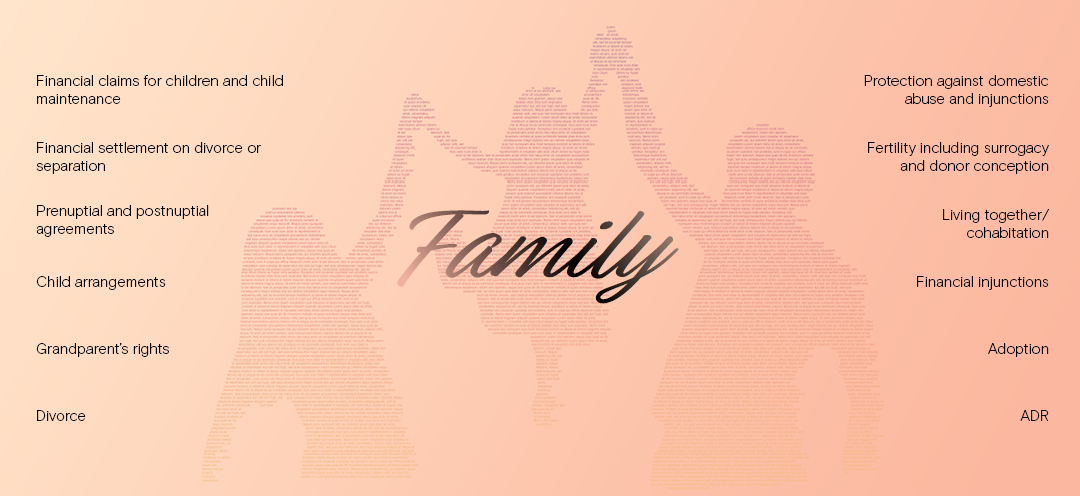Approaching family law solicitors for advice and assistance in relation to any aspect of your family, whether it is for a positive event, such as a prenuptial agreement before a wedding or parental order following surrogacy, or for a less welcome event, such as the breakdown of a relationship, can be stressful and emotionally charged. Whilst every situation is different, our family law advice aims to minimise unnecessary disputes and to ensure that you achieve the best outcome possible.
Our top priority is to offer cost-effective, professional and friendly family legal advice no matter what your situation or needs. Our team of family solicitors will work to ensure that we provide you with the best value for money.
How can our family law solicitors help?
With our family law solicitors based in Bournemouth, Southampton and London, we are easily accessible to help you at this difficult time. We are experienced in:



Many people now have connections abroad and this can lead to a whole range of complex legal issues following the breakdown of a relationship. Our family law lawyers are experienced in dealing with all types of international matters following divorce and separation including jurisdictional issues, disputes relating to children, multi-jurisdictional financial arrangements, the treatment of trusts on divorce and international adoption, surrogacy and fertility issues.
Not only are our family solicitors experienced in handling international family matters but we are also a member of MSI, a global alliance of lawyers and accountants, allowing us to arrange expert foreign legal advice quickly and efficiently.
Who do we help?
Our family law solicitors help a broad range of clients from entrepreneurs and business owners to homemakers and retirees.
Why choose us as your family law firm?
Our team are all members of Resolution, the professional body that encourages a non-confrontational approach to resolving family disputes. We aim to be fair but firm, using our skills and experience to help you achieve your desired outcome. When required we will adopt a robust approach to deal with difficult and opposing points of view. Our clients trust us to provide high-quality family law advice and exceptional client support in the most challenging of circumstances.
The extensive knowledge of our team means that we can think about wider issues for you and your family too – such as pensions, tax and family businesses. Whatever your needs and concerns we will direct you to the very best people to help you.
Family law solicitor prices
Recognising that paying legal costs can be a concern for individuals, we are transparent about costs and provide regular cost estimates and updates to assist in budgeting throughout the case. Our family solicitors can also provide information about ways to fund your legal fees.
Top tips
If you’re meeting with one of our family law solicitors for the first time here’s a quick guide to what to expect.
- As part of what we do, we’re required by law to check who you are. So everyone who meets with us is asked to verify their identify before the meeting, this includes providing certain documentation such as your passport or photo driving licence.
- You might also find it useful to make a note of any questions you have before the meeting and bring these along, that way we can cover all your concerns. If you think of more questions after the meeting, please feel free to contact us as we will be pleased to help.
- Meetings usually last 1-2 hours, depending on your circumstances, but we won’t place a limit on how much time we spend with you.
- We will charge you for the time spent in your initial meeting unless we’ve agreed on other arrangements with you and we’ll also add VAT to our fees and disbursements if these have been incurred. Please contact us for the team’s individual charge-out rates.
- Sometimes legal assistants or trainee family solicitors may also be present at your meeting. They are bound by the same terms of confidentiality as your solicitor and will respect them in the same way. If there are two people at your meeting, you’ll only be charged for one unless this has been agreed with you.
- We can’t carry out work under the public funding (legal aid) scheme but if we think you’re eligible we’ll let you know. We do offer certain fixed fee packages subject to availability and suitability from time to time.
Our website is filled with helpful resources, such as information pages and articles on the latest family news: here,
Please explore our website for more information and don’t hesitate to get in touch if you need assistance from our family team. For direct contact, reach out to our London office at 0207 492 9800, our Southampton office at 023 8082 7400, or our Bournemouth office at 01202 786161. We are here to help with your specific needs.





















